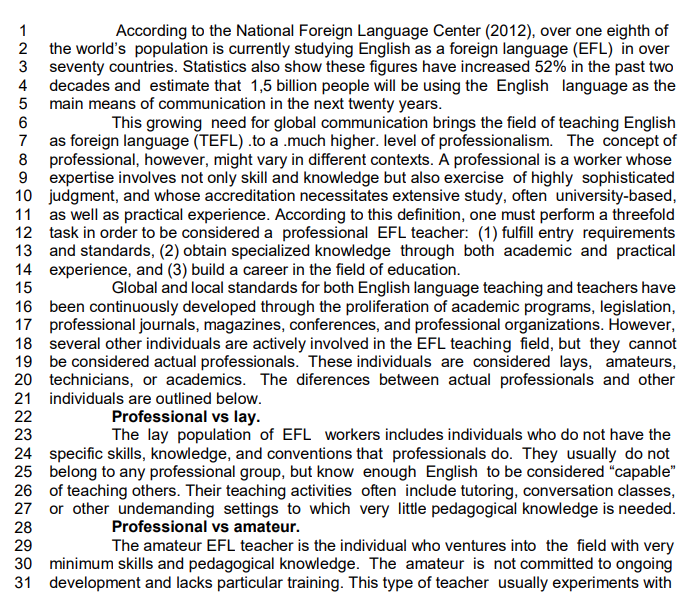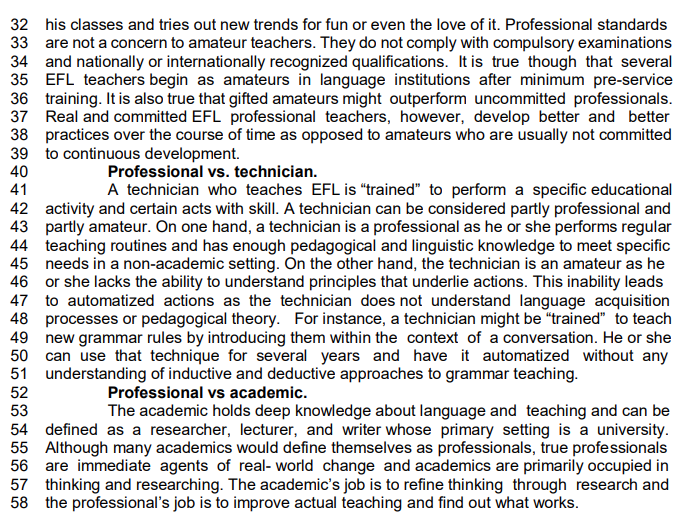Questões de Concurso
Comentadas sobre verbos | verbs em inglês
Foram encontradas 1.428 questões
“The professional of Teaching English as a Foreign Language”
Author: Anderson Francisco Guimarães Maia


Em uma atividade de sala, a professora pediu aos alunos que marcassem em suas agendas seus planos para a semana seguinte. Em seguida, eles deveriam sentar-se com um colega e simular um diálogo. Para realizar a atividade, ela escreveu na lousa o seguinte diálogo, a partir do qual os alunos deveriam usar corretamente um repertório linguístico aprendido para preencher a lacuna.
Aluno A: What __________ (do) on Monday/Tuesday/Wednesday…?
Aluno B: I ____________ (play soccer/go dancing/do my homework…) on Monday/Tuesday/Wednesday…
Para que os alunos sejam bem-sucedidos nessa atividade, é preciso que eles saibam usar corretamente qual tempo verbal?

Multidict.net. Advertising language. Multidict.net, 2024. Disponível em: https://multidict.net/clilstore/page.php?id=5243. Acesso em: 12 jul. 2024.
Uma das formas de identificar a função social de um texto é a partir dos recursos linguísticos usados. O anúncio publicitário acima tem a função social de induzir o leitor a ter um certo comportamento, que é alcançada, também, pelo uso de
Read the song lyrics below and answer the question.
Hand In My Pocket
Alanis Morissette
I'm broke, but I'm happy
I'm poor, but
I'm kind I'm short, but
I'm healthy, yeah
I'm high, but
I'm grounded
I'm sane, but
I'm overwhelmed
I'm lost, bu
t I'm hopeful, baby
And what it all comes down to
Is that everything's gonna be fine, fine, fine
'Cause I've got one hand in my pocket
And the other one is giving a: High five
I feel drunk, but
I'm sober I'm young and
I'm underpaid
I'm tired, but
I'm working, yeah I care, but
I'm restless
I'm here, but
I'm really gone
I'm wrong and
I'm sorry, baby
And what it all comes down to
Is that everything's gonna be quite alright
'Cause I've got one hand in my pocket
And the other is flicking a cigarette
And what is all comes down to
Is that I haven't got it all figured out just yet
'Cause I've got one hand in my pocket
And the other one is giving the peace sign
I'm free, but
I'm focused
I'm green, but
I'm wise
I'm hard, but
I'm friendly, baby
I'm sad, but
I'm laughing
I'm brave, but
I'm chicken shit
I'm sick, but
I'm pretty, baby
And what it all boils down to
Is that no one's really got it figured out just yet
Well, I've got one hand in my pocket
And the other one is playing a piano
What it all comes down to, my friends, yeah
Is that everything's just fine, fine, fine
'Cause I've got one hand in my pocket
And the other one is hailing a taxi cab
1.a) The coming and going of people is easy in a humanized city. 1.b) People are coming and going to choose their Christmas gifts.
2.a) Mike’s arriving to class late became a bad habit. 2.b) Look, Mike’s arriving to class late once more!
3.a) Jordan gets detention for his disrespecting the teachers. 3.b) Jordan gets detention for he’s disrespecting the teachers.
4.a) The candidate’s winning the elections in several key areas. 4.b) Her winning the elections was happily celebrated.
5.a) We are buying the gear for the weekend camping trip. 5.b) For the weekend camping trip, our buying the gear was expensive.
Fill in the blank with the appropriate verb form.

(Available: https://stock.adobe.com.)
“If you boil water, it ______________ into steam, that’s a scientific fact and there’s no doubt about it!”
Judge the next item, about the semantics and morphosyntax of the English language.
In the phrase "She enjoys playing the piano," the
gerund "playing" functions as a verbal noun, modifying
the verb "enjoys."
Regarding English grammar, judge the following item.
The modal verb "must" in English is always used to
indicate obligation or necessity, and it cannot be replaced
by "have to" without altering the meaning of the sentence.
Regarding English grammar, judge the following item.
In English, the subjunctive mood is only used in
hypothetical situations and is identical in form to the
indicative mood in all tenses except the present.
Regarding English grammar, judge the following item.
The English past perfect continuous tense is used
exclusively to emphasize the duration of an action that
was completed before another action in the past, and it
cannot be used in passive constructions.
1. The phrasal verb took place (1st paragraph) means happened, occurred.
2. The underlined words in th first paragraph mainly, completely, and occasionally are examples of adverbs of manner.
3. In the 3rd paragraph, the pronoun They (in bold), refers to the rings.
4. Women (1st paragraph) is the plural form of woman.
Choose the alternative which contains the correct sentences.
( ) The verb “understood” is incorrect, it should be replaced by “understand”.
( ) “are understood” is a present passive structure.
( ) “widest” is an adjective, that is in the superlative of superiority form.
Choose the alternative which presents the correct sequence, from top to bottom.
A. People who owned ______ (a / an) MP3 player ______ (was / were) considered popular back in the day.
B. Henrique no longer works ______ (on / in) Saturdays.
C. I ______ (do / don’t) know this song.
D. We’ve ______ (come /came) across as ______ (a / an) united group.
In the order presented, the gaps are correctly and respectively filled by:
Read the following dialogue.
Caio: Have you seen Joana lately?
Ramon: I hadn’t, but I heard she borrowed some money from the bank.
Caio: But what about her inheritance?
Ramon: Word has it she frittered all away.
Caio: That’s crazy!
Ramon: Yeah, I know.
Based on this dialogue, analyze the assertions below.
I. In “she frittered all away”, Ramon intends to say that Joana squandered all her inheritance.
II. Ramon correctly uses auxiliary verbs in his first and last lines.
III. “Lately” is a time adverb in Caio’s fist line.
The CORRECT assertion(s) is(are):
I. Carla always pretends to care.
II. I can’t stand his comments, they’re full of all types of prejudice.
III. It’s an important topic to discuss.
IV. How much times do we have to go over this project?
Mark these statements as True (T) or False (F).
( ) “Care” and “stand” are regular verbs in sentences I and II, respectively.
( ) “Go over” is a phrasal verb in sentence IV.
( ) Even though “pretend”, “important” and “prejudice” are similar in spelling to words in Portuguese, they are all false cognates.
( ) In sentences II and IV, the use of quantifiers is correct.
The statements are, in the order presented, respectively: